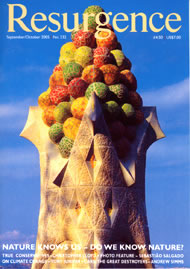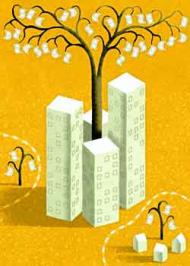WHEN THE CITIZENS of France and Holland gave their determined thumbs down to the proposed European Constitution, few commentators would have predicted that the vote could undermine the euro currency.
But in the wake of the vote, economists and business people in Italy - and probably other countries too - are wondering whether they should withdraw from the euro.
The debate about the euro has become stultified in a war of words between europhobes and europhiles, and people across the political spectrum are to be found in both camps. The 'phobes claim abolishing the pound hands power to Brussels. The 'philes claim joining the euro will help UK businesses to grow.
My objection to the euro is not that it is wrong for all Europeans to use the same currency. It is rather that the supply of euros to the economy is being undertaken in exactly the same way as that of the pound, with the problems of this method of creation being writ large.
Governments try to manage their economies by influencing the amount of money in circulation. Their thinking is that the amount of money circulating has to steadily rise to allow business, industry and the consumer to buy and sell increasing amounts of goods and services. But increases in the stock of money cannot be allowed to run ahead of the increase in goods and services; otherwise, inflation appears, which degrades the value of the money.
But finance ministers also believe that in a market economy it shouldn't be governments themselves which create the stock of money; rather, it should be left to bankers making day-by-day decisions on whether financial projects such as a business or house purchase are viable. So creating the stock of money is left to banks, and they do it by giving out loans for mortgages and businesses.
Finance ministers guide how this is done, and the only tool they currently use is the setting of interest rates. So the Bank of England raises interest rates because they feel inflation is getting a hold, the commercial banks follow suit, less money is borrowed, and therefore less new money is created. It is a light touch by government indeed.
Apart from the printing of bank-notes and the minting of coins (now only 4% of the money stock), this is how governments influence the amount of money circulating.
Bank loans and mortgages are not granted out of the savings on deposit, as is popularly assumed. Savings create the framework in which loans are made, but the loans are new money, adding to the national money stock: this is how most new money comes into existence.
There are several fundamental drawbacks to this way of creating money. First, although the banks create the money for the loan, the borrower has to find the interest elsewhere in the economy. Hence there is never enough money in the economy to pay back all the loans and the interest which is continuously accruing.
This causes businesses to desperately claw money out of the economy, forcing them to grow ever larger, to be ever more ruthless, and to exploit peoples and planet in a bid to ensure they, rather than their competitors, make profits and pay back the loans. The creation of money through loans on which interest is charged directly causes the economic growth which is destroying our life support systems.
THIS FUNDAMENTAL instability is the first problem. The second is that the statistics of who is owed money and who owes it show that it is the very wealthy who are owed the most, with the remaining 95% of the population all owing far more in interest than they receive. (Compare the interest charged on your mortgage payments with the interest you earn on your savings for a quick illustration of this.)
Hence the everyday creation of the stock of money results in a steady trickle of wealth from most of the population to the very wealthy. Not a trickle down of wealth to the poor, but a trickle up to the very rich.
The third drawback is that it is far easier to get money for a project which will make money than for a project which may be socially beneficial but may not earn enough to pay the interest. So businesses have banks willing to lend for more business, while projects for the poor, for the elderly, for the environment have to rely on grants, generosity or jumble sales.
The fourth drawback is that since interest is charged over time, and banks expect repayment over fairly short periods, long-term projects lose out. It is financially more viable to clear-cut a forest and sell the timber than to keep the trees standing and cut at the same rate as replanting.
Here in the UK we have spent twenty-five years debating the merits and otherwise of privatisation. Within this maelstrom of heated debate, there has been scant discussion about whether it's right that our stock of money should be created by privately owned banks.
The tragedy of the creation of the euro is that EU members missed the chance of creating money in different ways.
IN THE UK our attitude to currency is influenced by the monopoly of the pound in everyday trading. While many mainland countries throughout the world routinely trade in more than one currency (usually currencies from neighbouring states), here in Britain the pound has reigned supreme.
Initiatives such as Local Exchange Trading Systems and Time Dollars have shown there are possibilities for other currencies to run alongside the national currency. There is no reason why these currencies and the euro and the pound should not all circulate alongside.
The government could 'allow' the euro to circulate here (they currently don't actually forbid it, but they could encourage it as tax payments, for example). At the same time they could create some of the stock of pounds by adopting the practices of private banks.
The economy is a wholly owned subsidiary of the environment, and we desperately need to reduce our CO2 emissions. To do this we need to encourage the widespread adoption of solar water heating systems, photovoltaic panels and wind turbines. The government could set up its own banks to lend money to householders for these types of project and thereby also take on some of the role of adding to the stock of the money supply.
As the government banks would be creating this stock of money into existence, they would not need to charge interest as they would not need to pay interest to savers.
IT'S TIME we broke through the tyranny of money being created by private banks and recognised that a wealth of local currencies, a national currency, and an international currency can co-exist.
This myriad of currencies would mean that if the Frankfurt Central Bank raised euro interest rates because the Irish economy was overheating, small growers in Somerset could still access local money at affordable rates. It would mean that banks owned by local or national government could make funds available for small schools, care homes and bicycle tracks.
There is no reason why we have to decide between the euro and the Frankfurt Central Bank, or the pound and the Bank of England Monetary Policy Committee. We can have them all!








